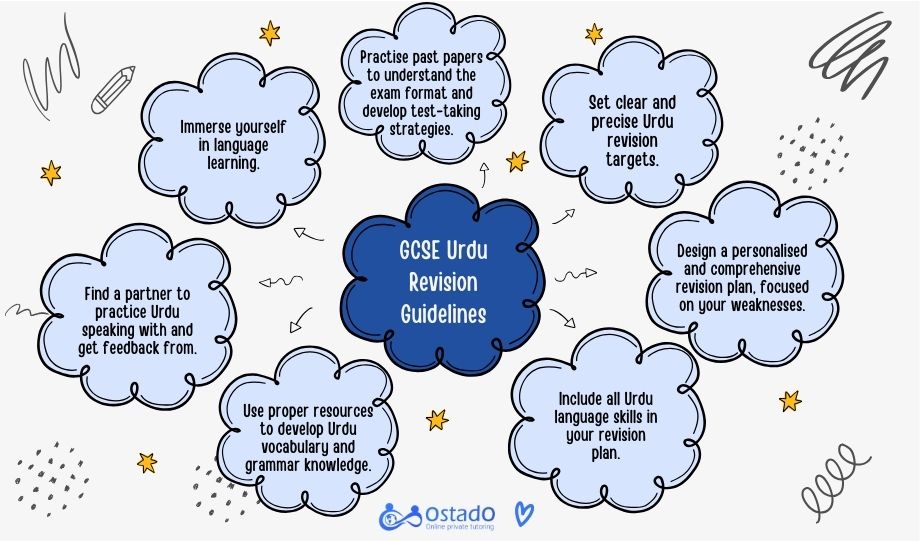Thanks to the dense population of Pakistani British people in the UK, Urdu has gained a place in the National Curriculum. If you’re originally from Pakistan and familiar with Urdu, taking GCSE Urdu is advantageous. However, despite Urdu being your mother tongue, the exam’s language level might surprise you. What can you do to successfully pass GCSE Urdu with a high grade? Well, it all starts with a good revision plan.
1. Define Revision Targets
You should define the GCSE grade you aim for and consider how much time. Decide whether you’ll take Urdu in the Foundation or Higher Tier, as this will shape your revision approach. Setting clear targets helps you build a practical revision schedule. Remember, rewarding yourself for meeting goals can keep you motivated.
Quantify your targets for better focus. For instance, instead of “Improving vocabulary,” set a goal like, “Learn 50 new Urdu words each week.”
Try to quantify your revision targets. For instance, instead of “Improving vocabulary”, you can say, “Learn 50 new Urdu words each week.”
Also read: How Many GCSEs Can You Take?
“On average, GCSE students choose to do 9 or 10 GCSEs to have a reasonable range of choices for university admissions and careers. It’s not a rule but rather something most students do. But what’s the right number for you?”
2. Make A Revision Plan
A well-organized revision plan is your roadmap, showing the steps needed to succeed. Ensure your plan covers all components of Urdu: grammar, vocabulary, and pronunciation. Allocate extra time to your weaker areas.
We offer free revision timetable templates to help you organise and track your study schedule. Start early with a 6-month revision plan to reduce daily study hours, which can help you avoid cramming closer to the exam.
Finally, select effective Urdu revision techniques based on your goals. Try note-taking, summarising, and self-testing. Keeping a notebook for new words can also aid in vocabulary building.
3. Practise All Language Skills
The GCSE Urdu exam assesses listening, speaking, reading, and writing, so you’ll need well-rounded practice. You might focus on speaking and listening one day, then reading and writing the next. Avoid spending more than 2 hours a day on Urdu revision to prevent burnout.
Also read: What Alternatives do you have to GCSE?
“Alternatives to GCSEs can provide a more practical approach to learning tailored to different strengths and interests. The most popular options are functional skill courses and apprenticeships.”
4. Expand Your Urdu Vocabulary and Grammar
Some students might put extra emphasis on either vocabulary or grammar, but both are equally important. Of course, you may choose to revise one more than the other based on your learning needs.
An excellent way to practise vocabulary is by using Urdu flashcards. You can either buy these flashcards or make them yourself. On one side of a small piece of paper, write the word, and on the other side, write the meaning, phonetics, and an example of the word. This way, you can customise your flashcards and keep them updated.
If you need more help with grammar, you need a more structured means of revision, and what’s more structured and organised than books? Urdu: An Essential Grammar is a comprehensive and learner-friendly book you can study to improve your Urdu grammar.
You can also use language learning apps like Ling to learn all Urdu language skills in one place.
5. Try Collaborative Learning
Learning any language through self-study is a demanding task, and it’s even harder to stay motivated. So, revising Urdu will be more fun if you can find a study buddy or join a study group of students who want to take GCSE Urdu as well.
Of course, it doesn’t have to be in person. You can join online forums and Facebook groups, websites like Reddit, or meet with other group members using Google Meet or Skype.
If you prefer to study by yourself but need help with the Urdu language, you can get help from Urdu GCSE tutors. They can be your teacher and language partner and make Urdu revision an exciting experience.
6. Practise Past Papers
Aside from familiarity with exam format, content, and mark schemes, past papers can be helpful in finding your knowledge gaps that need further revision.
Practising past papers is most effective when it’s done within a time limit. I’ve listed the time limits for each paper in GCSE Urdu. When you’re practising different sections of the exam, try to do it within the time limit. It helps you cope with the stress of time restraints and develop time management skills.
You can access past exams on your exam board’s website.
7. Immerse Yourself in Language Learning
Use every chance to practise Urdu, whether it’s reading news headlines, watching Pakistani TV shows, or listening to Urdu music. Extra-curricular materials like these add variety to your language-learning journey, but they are less reliable and structured than learning in the classroom or using self-study books. In short, these authentic materials are excellent means of intensifying the revision process, but they’re not a good language learning reference.
- Urdu podcasts:
- LingoHut: 125 five-minute free lessons to master Urdu vocabulary and pronunciation.
- Urdu Adab: Aimed at people who cannot read or write Urdu.
- Rekhrta Podcast: Learning Urdu with Urdu literature.
- YouTube Channels:
- UrduPod1010: Offers language lessons for all language skills.
- Urdu Course for Beginners: A basic Urdu conversation course.
- Urdu news:

Understanding the GCSE Urdu Exam Format
The GCSE Urdu exam consists of four papers, each focusing on one language skill. While formats can differ slightly by exam board, here is a general breakdown:
- Paper 1: Listening
Listen to several audio tracks (conversations, announcements, or monologues) and answer gap-fill, short-answer, or multiple-choice questions. Foundation Tier has 35 minutes, Higher Tier has 45 minutes, and it’s worth 50 marks. - Paper 2: Speaking
This section, worth 60 marks, has three parts: discussing a scenario, describing a photo card, and having two conversations (one topic chosen by the examiner and one by you). The Foundation Tier allows 7-9 minutes, and the Higher Tier allows 10-12 minutes. - Paper 3: Reading
Texts range from ads and emails to stories. Question types include true/false, gap fills, and a final translation from Urdu to English. The Foundation Tier allows 45 minutes, and the Higher Tier allows 60 minutes for 60 marks. - Paper 4: Writing
Foundation Tier includes three tasks: a short message (50 words), a brief essay (70 words), and an English-to-Urdu translation, with a 60-minute time limit. Higher Tier requires a longer passage (around 150 words) and translation.
The GCSE Urdu exam consists of 4 papers, each focusing on one language skill. There might be slight differences between the properties of each paper in different exam boards, but the descriptions below are true for most exam boards.
Paper 1: Listening
Examinees listen to several audio tracks and answer the following questions. The audio tracts can be in the form of conversations, announcements, or monologues. The question types in this section are gap-fills, short-answer, and multiple-choice questions.
In the Foundation Tier, students have 35 minutes to answer the questions and in the Higher Tier, 45 minutes. Paper 1 consists of 50 marks.
Paper 2: Speaking
The speaking section of GCSE Urdu is worth 60 marks and consists of three parts. In the first part, test takers must discuss a given Urdu scenario. In the second part, the examiner shows the test taker a photo card, and they have to describe it and answer follow-up questions.
The last part involves 2 conversations on two different topics. The examiner and the examinee each choose the topic of one conversation. The topics are usually about culture, identity, and future aspirations.
In the Foundation Tier, students have 7 to 9 minutes, and in the Higher Tier, they have 10 to 12 minutes to answer the questions.
Paper 3: Reading
The reading section of GCSE Urdu consists of several texts of varying lengths and complexity levels. The texts can be in the form of advertisements, emails, letters, short articles, or extracts from stories.
You can find various question types in the reading section depending on the text. These can be true/false questions, short-answer questions, gap fills, and MCQs.
Additionally, there is a translation section at the end of paper 3 that requires the test takers to translate a text from Urdu to English. This part aims to assess the student’s ability to understand the text in Urdu and convey the meaning in English.
The allocated time for paper 3 is 45 minutes for the Foundation Tier and 60 minutes for the Higher Tier. The questions in the reading section are worth 60 marks.
Paper 4: Writing
The writing section assesses the test taker’s ability to communicate in written Urdu.
In Foundation Tier, the students have to respond to three short tasks. They should write a brief message (about 50 words) and an essay (about 70 words) and translate an excerpt from English to Urdu. They have 60 minutes to complete the tasks.
In Higher Tier, students should write a passage about the given prompt. They should be able to express their answer in around 150 words. They should also translate a text from English to Urdu.
Key Takeaways:
- Don’t limit yourself to classroom content or revision books.
- Use authentic materials (e.g., music, TV shows, stories, news, etc.) to improve your Urdu.
- Try to find someone with whom to practice Urdu. You can use language exchange websites like Speaky to find a partner to teach and learn languages together.
- Make a revision plan with detailed and achievable goals.
- Stay positive! You can do it. Good luck.
GCSE Urdu Revision
- What are the themes of GCSE Urdu?The themes used in GCSE Urdu are chosen from global topics such as free time activities, education, hometown, future career and the like.
- What are GCSEs in Pakistan?GCSE qualifications in Pakistan are equivalent to British O-Levels, which students take at the age of 14-16.
- How much revision is enough for GCSE?It depends on your learning style, current understanding of the subject, and the techniques you use to revise for GCSEs. On average, you should revise between 100-120 hours for each GCSE you want to do. This means that you should start your revision plan early.

